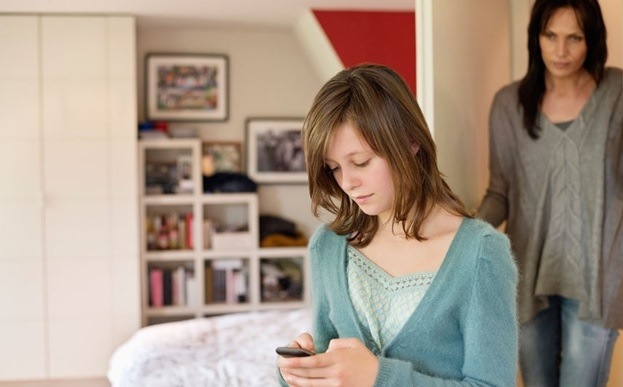Are you going through that phase when you are just so curious about your teenage daughter, and you really need to know what she’s been up to?
Don’t beat yourself up; we all go through that phase. Many parents find it quite uncomfortable trying to find out more when she is just not letting up; should I spy on her, bug her phone, or ground her? It’s a real dilemma, trust me, you are not alone. It’s a normal phase you pass through when your baby is growing up.
We all handle this phase in different ways, I stumbled upon Circle of Moms, while trying to figure out how other Moms handle this, and here’s what some Moms think when the question was posed; should you snoop on your teen?
Jennifer Shallow W – I put the desktop shark on my 17 yr old cell, after reading some alarming things on FB, it has a GPS also and you can see messages. I don’t care if it seems like an invasion of privacy but teens today think they are adults and are not equipped emotionally for the things they are doing!
Mary Rellinger – I do not snoop or spy. However, as a parent, I always want to be “in the know” as to what my children are doing or where they are. If I suspect something is not right or that they are lying to me… then I may have to do some detective work.
Casey Ratledge – Oh yes I will, Proverbs 31 says a wise woman knows what goes on in her household! (A verse from the bible)
Francene Alba – As a parent, I am out for the best interest of my 15 yr old. I don’t view snooping as a sign of lack of trust. I don’t use snooping as a tool to confront issues that I may disagree with, but rather use it to gather info to use for my peace of mind that my child is ok, and dealing with common teen issues.
Nedra Webster – Every parent should go through their child’s possessions. You can sit around and wait for a teenager to tell you there’s a problem if you want, but God will be here before that happens. I went through backpacks, pockets, phones, closets, drawers and the car (once he started driving). Till this day, my son will tell his friends, he never underestimates my ability to find out things.
And Julie Rasac says – If my daughter ever gave me a reason to snoop on her I would. But she has never given her dad or I a reason to distrust her judgment.
Now you can see a lot of parents feel safer knowing what their teen has been up to.
Let’s take a look at what some specialists say; Dr. Michele Borba, Educational Psychologist and best-selling author says; When it comes to teens, trust is a two-way street that has changed over the last decade or so with the arrival of apps and devices that help parents track their teen’s social media accounts, text messages and even driving habits. But while it may feel like spying to read another person’s email or track their whereabouts, it’s not spying when your teen knows she’s being monitored. “Safety is always the top priority when it comes to parenting,”
Dr. Borba shares some tips on how to monitor your teen and not feel like its snooping.
- Hands – on parenting lessens risky behavior. If there’s one thing kids need from us, it’s for us to be present. Hands-on parenting means monitoring behavior, knowing your kids’ friends, setting clear rules and not being afraid to say no. “Study after study proves that the best protective action you can take as a parent is to keep the lines of communication open with your teens”.
- Involve them from the start. “Tell them you will monitor, but don’t tell them when or how often you’re monitoring. Many parents every once in a while will say, ‘Turn in your cell phone, and let’s make sure you’re abiding by the rules of the house,’ The child has to build your trust, and when they can demonstrate responsibility, then you gradually let them have more and more responsibilities and freedom.
- Learn their language. Parents need to know teen shorthand and acronyms so they can understand what they’re reading. For example, MOS means mom over shoulder, KPC means keeping parents clueless, LMIRL means let’s meet in real life and GAP means got a picture. Google “texting abbreviations” or “online language” and you’ll find cheat sheets to help you.
- Set rules for sharing. Teach kids that there are no “take-backs” when it comes to the internet, and they should think about what they post as being live for everyone to see forever — including Grandma. Teens should not share personal information, such as full name, birthday, address, social security number etc. as this makes them easier to locate. If you find they break these basic safety rules when you’re monitoring, make sure there’s a consequence.
- Take advantage of tools and apps. Parental controls, internet service providers, computer software and various apps can monitor texts and emails, block visits to inappropriate sites (hate sites, pornographic sites) and email you reports of their online activity, though tech-savvy teens can figure out how to get around such things, that’s why they should be in the know. Be honest and let them know you’ve installed software. “Just don’t divulge what kind”.
- Set curfews, and definitely wait up. “Peer pressure is huge. Teens need safety nets. There is no better excuse than for a kid to be able to use than, ‘Mom will ground me for life if I don’t get home.’ Do tell your teen that he or she has your full permission to always use you as an excuse”.
- Be their safety net. You may have seen a recent viral story about a dad who gave his teen son a way to safely get out of social situations when he’s uncomfortable. Sometimes teens feel they can’t call or text for help because other kids will hear or see. So this duo set up an escape system where if the teen texted the father an “X,” the father would drop everything to come pick him up, wherever he was, no questions asked. Dr. Borba says it’s an excellent system, and it doesn’t matter whether it’s an X or an ABC, the catch is; you have to honor the “no questions asked” part. She has heard from kids who’ve tried this emergency escape plan only to get the third-degree from a parent later on, and they never used it again.
Be their safety net and you may just find that they won’t need the monitoring.
By Boma Benjy Iwuoha





Comments are closed.